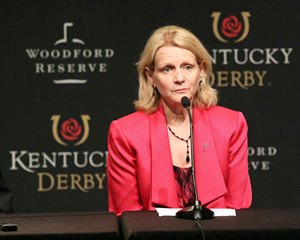Maximum Security Connections May Appeal After Derby DQ


Owner Gary West and trainer Jason Servis are giving thought to appealing a stewards' decision that saw their Maximum Security become the first horse disqualified from victory for interference in Kentucky Derby (G1) history.
After the decision May 4 at Churchill Downs, Kentucky chief steward Barbara Borden said Saturday evening that the three stewards unanimously agreed to disqualify Maximum Security after they determined he had interfered with War of Will (No. 1), which caused chain-reaction interference with Long Range Toddy (No. 18) and Bodexpress (No. 21).
By rule, Maximum Security was placed behind the horses with which he interfered. In this case, War of Will finished seventh, Bodexpress 13th, and Long Range Toddy 16th. Maximum Security was placed behind the latter, in 17th.
Borden said objections were filed after the race by the rider of Country House, Flavien Prat, who reached the wire second; and the rider of Long Range Toddy, Jon Court. The stewards determined Maximum Security did not interfere with Country House, who was placed first.
In a statement to the media, Borden outlined the unanimous decision while seated between commission steward Brooks "Butch" Becraft and association steward Tyler Picklesimer in the Churchill press conference room. Borden did not take questions from reporters.
"The riders of the 18 (Long Range Toddy) and 20 (Country House) horses of the Kentucky Derby lodged objections against the 7 horse (Maximum Security), the winner, due to interference turning for home near the quarter pole. We had a lengthy review of the race. We interviewed affected riders. We determined that the 7 horse drifted out and impacted the progress of No. 1, in turn interfering with the 18 and 21. Those horses were all affected, we thought, by the interference.
"Now, therefore, we unanimously determined to disqualify No. 7 and place him behind the No. 18, the 18 being the lowest-placed horse that he bothered, which is our typical procedure."
The inquiry sign was never posted. The objection sign was posted. The stewards' decision took nearly 22 minutes, 21:57 to be exact, according to a Churchill spokesman.
Maximum Security's trainer, Jason Servis, said an appeal would be considered.
"I think we can appeal to the stewards for sure. I think there will be a certain amount of time you can appeal," Servis said. "I don't know if it's 48 hours or 72 hours, but there's a certain amount of time you can appeal. I think we're leaning that way. I think we are. I'll get with Mr. West and see what we think."
Owner Gary West said they would first like to review the video with the stewards, but he was told that would not be possible until May 9. He said the rule may require that they file the appeal before Thursday to meet a deadline. But West had not made a decision on an appeal as of Saturday evening.
"We'll just have to look at the films and see what we think after looking at the films," West said. "We need to look at what the stewards looked at. If we can't look at films until Thursday, we'll have to make a decision before that, probably."
West also said, "If the horse did something wrong, then I won't feel bad at all."
Of concern for the Maximum Security connections, Servis said he talked with the stewards after the race and was told that only the rider aboard Country House, Prat, had filed an appeal. The Maximum Security camp also questioned why an inquiry wasn't posted. Servis said the stewards didn't even mention War of Will to him.
Bill Mott, trainer of declared winner Country House, later said that he has noticed stewards seem less inclined to post inquiry sign at tracks throughout the country.
Depending on the nature of the appeal, Kentucky rules allow anywhere from up to 48 hours to one year to file a complaint. A catch-all rule that seems to apply most closely here would be one week. It reads, "Within one (1) week after post time of the race, if the objection or complaint is based on any other violation."
Kentucky rules not only set deadlines for appeals, they also preclude some matters from being appealed. Kentucky rules say stewards' findings of fact and rulings on on "matters occurring and incident to the running of the race," shall be final and not be subject to appeal.
Kentucky's rule on interference is in line with most jurisdictions in which if it's determined a horse interferes with another horse, costing that horse a placing, the horse who caused the interference will be placed behind the horse with which it interfered.
Kentucky's interference rule reads: "A leading horse, if clear, is entitled to any part of the track. If a leading horse or any other horse in a race swerves or is ridden to either side so as to interfere with, intimidate, or impede any other horse or jockey, or to cause the same result, this action shall be deemed a foul. If a jockey strikes another horse or jockey, it is a foul. If in the opinion of the stewards a foul alters the finish of a race, an offending horse may be disqualified by the stewards."
